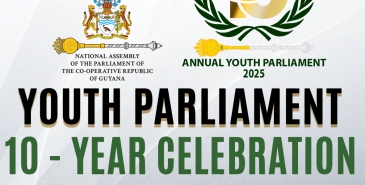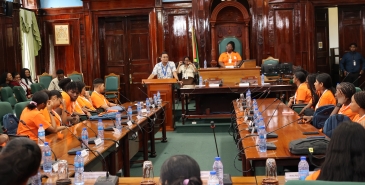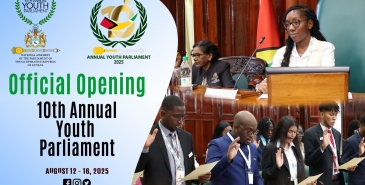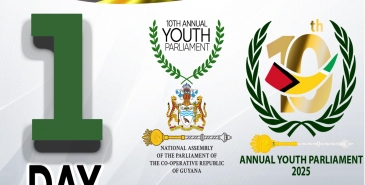Budget 2012
Speech delivered at: 7th Sitting- Tenth Parliament - 10 April, 2012
10 April, 2012
5646
Mr. Scott: Thank you Mr. Speaker, Comrades all. Congratulations first of all to the Hon. Finance Minister for once again presenting to us a budget. It is my hope that he take on board the measure, advice and the opportunities that we have given to him from this side, that if together we can adopt those measures, which he has the power to do, then ultimately this budget does have the possibility of being regarding as a people’s budget.
My colleague, the Hon. Shadow Finance Minister, Mr. Carl Greenidge has splendidly illustrated some of the inefficiencies that are contained in this budget. In this respect, I fully support his observations and I hope that that too will be seen in a positive sense that we can then take all the measures and arrive at something much better for the Nation as a whole.
In the not too distant past, budget presentations were anticipated with some excitement and hope by the poor and their trade unions, that the Government of the day will introduce some measures which would offer them some financial and economic relief, while assisting in their further development. There were prior consultations with their representative and with businesses. All above were therefore involved.
Today this practice no longer exists. There are no longer consultations and even when the combined Opposition offered to be involved in the crafting of the budget, the Government rejected this attempt at national consensus and proceeded to deliver from on high, what they thought was good enough for the citizenry.
The rejection, the anger and the disappointment of the masses reverberates around this land in response to a budget devoid of any measure designed to alleviate poverty and or of any vision that points the way toward a better life for all.
When the Finance Minister, the Hon. Dr. Ashni Singh, admitted that after the 2011 National Elections, a new political configuration had emerged, we all expected to see a changed approach. He said, “This arrangement beckons our country into a new political epoch and heralds an opportunity for the nurturing of a new political culture.” He was even inspired to wax further when he added, “The current dispensation will require us to eschew political opportunism and grandstanding and work together to make good and sound decisions that can withstand the test of time.”
Our leaders were nationalistic and positive as the Leader of the Opposition dubbed the year 2012 as ‘The Year of Hope’ in his New Year’s message to the nation. The Opposition even pledged to agree to an extension for the budget presentation in order to incorporate inputs from civil society and from other representatives of the people, but this offer was rejected.
Alas this budget, as part of its theme “Remain on Course” continues to fail the poor and the powerless. It brings no increase in wages, no positive increase in pensions or social assistance and it consigns the masses to spend more for less. As the Government boasts of increase in revenue of 6.2% projection, what constraints exist, if any, to prevent a caring Government from offering a meaningful wage and pension package using a portion of this increased revenue to alleviate the hardship they go through daily? Instead, this budget seeks to redress mismanagement and incompetence with its gifts of billions of dollars to GUYSUCO and GPL.
In this 2012 Budget, the Finance Minister Announced that $4 billion from Government will be transferred to GUYSUCO. At the stroke of a pen, taxpayers’ money is again given to a failing corporation. For what purpose, and when will it end? This money, he says, is to meet operating costs and investment requirements. This is an entity that constantly fails to achieve its targets. Land valued at $39 billion at Diamond was sold to the Ministry of Housing for $4 billion. Mr. Speaker, who benefitted from the $35 billion gift to the Ministry of Housing? Now they expect to receive billions of dollars for operating cost and support for a turnaround plan that turn in a downward spiral of continuous losses. When will it end?
The Minister, himself, said that in 2011 the sector produced 236,506 tonnes of sugar, the largest since 2008, yet in each of those years production targets were not met. Can you tell us what the profit level is of this company, and when will such be declared to the nation? How distant and large does the 273,317 tonnes for the year 2000 and 292,297 tonnes for the year 2001, produced without mechanisation now seem to us?
Every year we are fed the same excuses for failure – poor weather, pest infestation, strikes and low turnout of workers ranging from 72% to 52% yet nothing is done to arrest these trends. This is a serious indictment of the Board of GUYSUCO.
They lament the loss of the European Union market and use it as a further excuse for the decline in profits but in effect they were unable to take advantage of rising prices on the world market at that time. They could have gotten at least $00.25 per pound on the world market as against the lower prices from the European Union prices. We had a windfall and we failed to capitalise on it. Other countries like Mauritius benefitted from this move while we dithered.
We also could not benefit because we could not produce enough to meet the market – a grievous mismanagement problem – which was compounded by the poor treatment of their workers. A few weeks ago frustrated and dissatisfied workers fed up with the poor labour relations went on strike at Blairmont Estate calling for the removal of senior management staff. This situation can be duplicated throughout the industry.
The workers have lost confidence in their Union which they perceive as politically controlled, no longer offering effective representation. The fearful noise after the Hon. Mr. Moses Nagamootoo descended on Berbice, bears out this point. The workers are concerned at the wastage, theft and corruption they witness. What has become of the Italian tractors bought for $170 million and which worked for six months?
We call on the Parliamentary Committee on Natural Resources to visit Skeldon during the in-crop period and report on the situation on the ground. Tell us how much power GUYSUCO has sold to GPL under the Co-generation Power Purchase Agreement and what is the state of accounts?
When we arrest the endemic corruption, improve the labour relations between workers and management then, and only then, we can begin to appreciate the dream of the Finance Minister of achieving the target of 400,000 tonnes.
Mr. Speaker, our society is in a state of disbelief at the revelation that the directors of GPL can demonstrate such contempt for the masses in the irresponsible and non-accountable disposal of their money used to rent generators. Convinced that they can get away with any dubious investment once an explanation is proffered, they felt secure in the certainty that business as usual will continue. They brokered this strange rental agreement that cost the taxpayers – Kaieteur News revealed – US$720,000 each year for each generator. When we consider the alternative as this article suggests, we can only conclude that the commission of this act borders on criminality.
Given that the caterpillar generator costs US$900,000 to acquire, wisdom would show that it is better to buy the generator utilizing loan capital by borrowing the US$900,000 and creating, as a result, an asset for the corporation. How many such deals await parliamentary investigation? The Government wants to give $6 billion to prop up this inefficient entity.
When GPL becomes efficient it would be profitable with affordable tariffs and there would be no need for taxpayers’ bailout. We spoke to a woman from Vreed-en-Hoop, whose meter was taken away in December, 2011. She went into them, paid everything that was required; the installation of a new meter was promised to her before Christmas but sadly she is still waiting, in April, 2012, for that meter. If this non-service is replicated we will clearly see the incompetence and mismanagement that permeates this corporation. Loss of sales can be reduced as many customers want to pay for service that they receive but due to this inefficiency GPL is not getting the returns available from sales. They must, therefore, focus on correcting these faults. They must expand to un-served areas rapidly; this will encouraged citizens to build and sales will therefore increase. Concentrate, they must, on minimizing line losses thus allowing people to pay for what they use and rectify billing to large businesses for their actual consumption.
They must reintegrate large private companies onto the national grid, assuring efficient supply of power.
They must relocate customer offices from above rum shops as now obtains in Sheriff Street and rent or buy customer friendly buildings that provide access for the differently-abled.
They must remove political appointees as Directors and management and, finally, hire professionals and set efficiency targets for them to attain.
When management can concentrate on these things effectively then, rather than look for bailouts, GPL in a year or two will become a profitable entity.
Mr. Speaker, the actuarial review at 31st December, 2006, for NIS makes for frightening reading and points to a possible collapse of the scheme as happened in other countries unless urgent remedial action is taken.
At its launching in 1969, NIS offered the best social security umbrella for the working people and led the way in the West Indies as the most progressive and secure means of giving a cushion to the sick, the pregnant and the aged. In spite of being vilified by the PPP who referred to the scheme, not as NIS but as ‘SIN’ and who did not encourage their supports to participate, the workers came to realise the social benefits to be derived.
Many in the sugar belt came to see the scheme as a blessing during the out of crop season and even now the number of beneficiaries in the sugar sector is greater than those in the non-sugar sector. Their PPP/C supporters are now seeing that political interference has resulted in poor board investments that places in jeopardy their years of contributions and threatens the long-term viability of the scheme.
My Colleague, Shadow Finance Minister, the Hon. Mr. Carl Greenidge has warned of the grave financial peril faced by the scheme and posits another bailout from the Government to prop up the sinking ship… Has bailout become the new plaster for incompetence? Christopher Ram points to the $6 billion that NIS invested in CLICO and questions whether CLICO will honour its bet. Government’s parliamentary resolution guaranteeing state support for recovering NIS investment in CLICO fails to mount an investigation into the questionable decision of the board in this worrying matter instead there is silence on these decisions.
What is now needed is a reconstituted board independent of political direction, a revamped inspectorate, the life blood of the scheme, a new programme to register more self-employed persons into the scheme, a modern management plan to reduce operational costs, greater implementation of recommendations of the Actuary and a new process to register citizens at birth rather than at 16 years of age into the scheme.
While we support the investment of the scheme’s funds, both locally and internationally, such investments must be prudent and transparent. The NIS must be perceived as a social security umbrella in which all citizens can have confidence in its management and continued viability.
In conclusion, this budget speaks of Government’s increased revenue by 12.1% over the previous year. Such agreements can be reached with the Opposition to review and double Old Age Pension, Public Assistance and raise the minimum salaries of all government workers by 10% across the board in the first instance as outlined in the APNU’s Peoples Bill of Rights.
Let us resolve to develop and implement systems that will promote efficiency in management which in turn will lead to better services to the population. With these modifications and with cooperation on both sides of the House we can take Guyana forward to a brighter future. I thank you. [Applause]
Speech delivered by:
What's New

17 August, 2025
10th Annual Youth Parliament Closes: Celebrating a Decade of Impact, Excellence, and Youth Empowerment10th Annual Youth Parliament Closes: Celebrating a Decade of Impact, Excellence, and Youth Empower

13 August, 2025
Youth Parliamentarians Assemble for Grand Rehearsals for the 10th Annual Youth Parliament

12 August, 2025
10th Annual Youth Parliament Kicks Off – Young Voices, Bold Ideas, Bright Futures!

11 August, 2025
10th Annual Parliament Kicks off tomorrow

